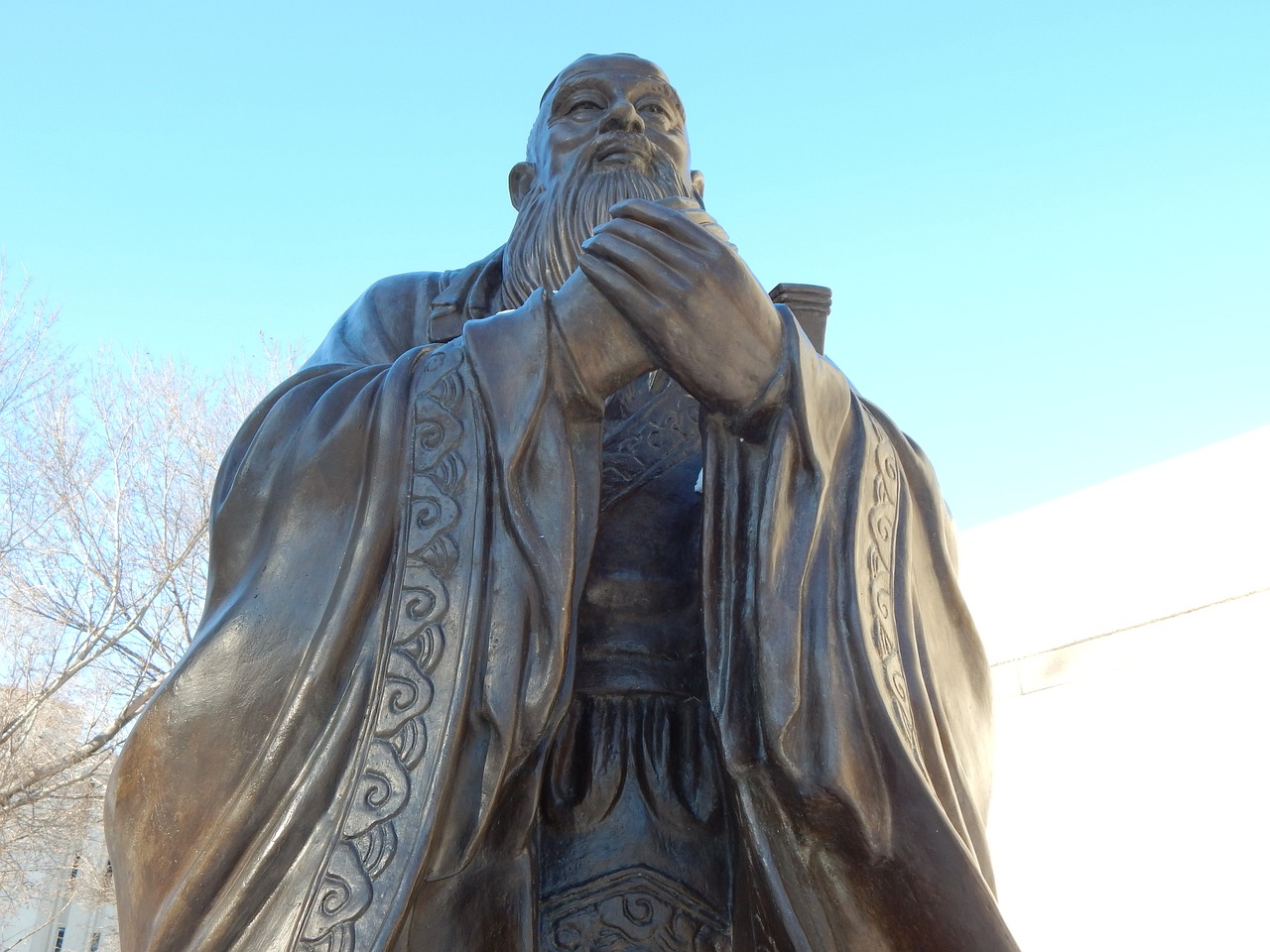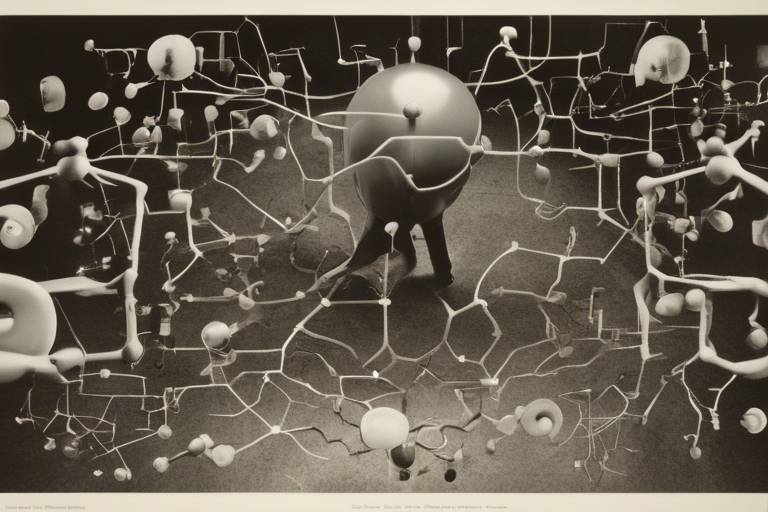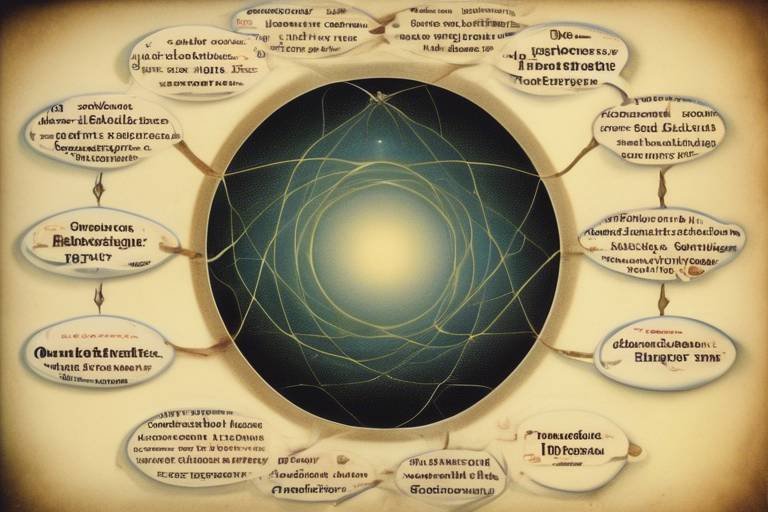The Role of Identity in Metaphysics
Identity is a concept that resonates deeply within the realm of metaphysics, acting as a cornerstone for discussions about existence, reality, and the self. When we think about identity, we often ponder the question: What does it mean to be? This inquiry leads us down a fascinating path where philosophy, psychology, and even science intermingle. The exploration of identity not only helps us understand ourselves better but also challenges the very fabric of what we perceive as reality.
At its core, identity serves as a lens through which we examine our existence. It raises critical questions such as: Are we defined by our experiences, our thoughts, or something more profound? In metaphysical discourse, identity is not merely a label; it is an intricate tapestry woven from our memories, beliefs, and interactions with the world around us. As we navigate through this article, we will uncover how various philosophical perspectives have shaped our understanding of identity, and why it remains a pivotal topic in metaphysical discussions.
As we delve deeper, it becomes clear that identity is multifaceted. It encompasses personal identity, which relates to our sense of self over time, as well as numerical identity, which addresses what it means for something to be the same entity at different times. Moreover, qualitative identity invites us to consider the characteristics that make one entity distinct from another. Understanding these dimensions of identity is crucial as they lay the groundwork for engaging with more complex metaphysical inquiries.
The implications of identity stretch beyond the individual and into the collective. For instance, how do cultural and societal identities shape our understanding of who we are? This question invites further exploration into the interplay between personal experiences and the broader context of existence. As we progress through the article, we will not only examine historical perspectives on identity but also contemporary views that challenge traditional notions. By doing so, we aim to provide a comprehensive understanding of the role identity plays in metaphysical thought.
- What is identity in metaphysics? Identity in metaphysics refers to the qualities and characteristics that define an entity, influencing our understanding of existence and reality.
- How has the concept of identity evolved over time? Philosophers from Plato to contemporary thinkers have shaped our understanding of identity, each contributing unique perspectives that challenge or affirm traditional views.
- Why is identity important in understanding the self? Identity helps us navigate our personal experiences and interactions, ultimately shaping our self-awareness and understanding of our place in the world.

Understanding Identity
Identity is a fascinating concept that encompasses the qualities and characteristics that define an entity. It's like the fingerprint of existence—unique to every individual and yet deeply intertwined with universal themes of existence and reality. When we talk about identity, we often refer to several theories that explore its nuances, such as personal identity, numerical identity, and qualitative identity. Each of these theories offers a different lens through which we can examine what it means to be 'us' in a world that is constantly changing.
To break it down further, let's consider personal identity. This aspect focuses on what makes someone the same person over time, despite the myriad of changes they might undergo. Think of it as a river: while the water flows and changes, the river itself remains the same. This raises intriguing questions: Is it our memories that anchor us to our past selves? Or is it our consciousness that provides continuity? Philosophers like John Locke argue that memory plays a crucial role in personal identity, suggesting that our past experiences shape who we are today.
Next, we have numerical identity, which refers to the concept of an entity being one and the same throughout different contexts. Imagine a single tree in a forest: it is the same tree whether you see it in spring or winter, during the day or at night. This perspective leads us to consider the implications of identity in a broader metaphysical context. For instance, if a person undergoes a significant transformation, like a change in beliefs or values, do they still remain the same individual? This question is at the heart of many philosophical discussions surrounding identity.
Lastly, we encounter qualitative identity, which focuses on the properties that make an entity similar or different from another. If we think of two apples—one red and one green—they may share the same basic identity as 'apples,' but their qualities set them apart. This dimension of identity invites us to consider how we categorize and perceive the world around us, influencing our understanding of existence itself.
As we dive deeper into the metaphysical discourse surrounding identity, it's essential to recognize that these theories do not exist in isolation. They interact and overlap, creating a complex tapestry that reflects our understanding of self and existence. The exploration of identity is not just an academic exercise; it resonates with our everyday lives. After all, who are we if not the sum of our experiences, memories, and choices? The interplay between these theories provides a rich ground for discussion, inviting us to ponder our own identities and what they mean in the grand scheme of reality.
In summary, understanding identity involves navigating through various theories that challenge and enrich our perception of self. From personal continuity to numerical sameness and qualitative distinctions, each aspect contributes to a broader understanding of what it means to exist. The journey into the nature of identity is not just philosophical; it’s an exploration of our very essence as individuals in a vast, interconnected universe.

Historical Perspectives on Identity
The concept of identity has been a significant topic in philosophy for centuries, with thinkers from different eras contributing their unique perspectives. Understanding identity isn't just a matter of knowing who we are; it delves into the very essence of existence and reality. Throughout history, various philosophers have grappled with these questions, each leaving an indelible mark on our understanding of identity. From the ancient musings of Plato to the revolutionary ideas of Descartes, the evolution of identity theory showcases a rich tapestry of thought.
One of the earliest and most influential figures in this discourse is Plato. He introduced the idea of abstract Forms, which he believed represented the true essence of things. For Plato, the physical world is merely a shadow of these eternal Forms, and understanding one's identity is about grasping these higher realities. In his view, what we perceive through our senses is just a fleeting image of the true essence that exists beyond the material realm. This notion has profound implications for how we view our own identities, suggesting that our true selves are linked to these timeless Forms.
Following Plato, we encounter René Descartes, whose famous declaration, "I think, therefore I am," revolutionized the concept of personal identity. Descartes posited that the act of thinking is the foundation of self-awareness. His assertion emphasizes the importance of consciousness in defining identity, suggesting that our thoughts and experiences are central to who we are. This perspective shifted the focus from external attributes to internal cognition, paving the way for modern discussions on the self.
As we move through history, the dialogue surrounding identity evolves. Philosophers such as John Locke introduced the idea of personal identity being tied to memory and consciousness. According to Locke, continuity of consciousness is what makes a person the same over time. This idea further complicates our understanding of identity, as it raises questions about how experiences shape who we are and whether identity remains constant or changes over time.
In the 20th century, existentialist thinkers like Jean-Paul Sartre challenged traditional notions of identity by emphasizing the fluidity and subjectivity of the self. Sartre argued that identity is not a fixed essence but rather shaped by our choices and actions. This perspective encourages individuals to take responsibility for their identities, suggesting that we are constantly in a state of becoming rather than merely being.
Moreover, the rise of postmodernism has further complicated the discourse on identity. Postmodern thinkers argue that identity is fragmented and constructed through social and cultural contexts. This view posits that there is no singular, stable identity; instead, our identities are influenced by a myriad of factors, including race, gender, and societal norms. This perspective challenges the very notion of a cohesive self, leading to rich discussions about the nature of reality and existence.
In summary, the historical perspectives on identity reveal a complex interplay of ideas that have evolved over time. From Plato's abstract Forms to Descartes' emphasis on thought, and from Locke's continuity of consciousness to the fluidity proposed by existentialists and postmodernists, the discourse on identity is anything but straightforward. Each philosopher contributes to a broader understanding of what it means to be, inviting us to reflect on our own identities in a world where the only constant is change.
- What is the significance of identity in metaphysics? Identity is crucial in metaphysics as it helps us understand existence, reality, and the self, influencing how we perceive the world and our place in it.
- How did Plato influence the concept of identity? Plato's theory of Forms suggests that our true essence is linked to eternal, abstract ideas, shaping our understanding of identity beyond the physical realm.
- What did Descartes contribute to identity theory? Descartes emphasized consciousness as the foundation of identity, arguing that self-awareness through thought defines who we are.
- How do existentialists view identity? Existentialists like Sartre argue that identity is fluid and shaped by individual choices and experiences, rather than being fixed or predetermined.
- What is the postmodern perspective on identity? Postmodernism posits that identity is fragmented and constructed through social contexts, challenging the idea of a stable, cohesive self.

Plato's Theory of Forms
Plato's Theory of Forms is a fascinating and profound exploration of the essence of reality. He proposed that beyond our tangible world lies a realm of abstract Forms, which are the true representations of all things. Imagine walking through a gallery filled with paintings; while each painting is unique, they all share the same essence of 'art.' Similarly, Plato believed that the Forms are the perfect versions of concepts such as beauty, justice, and equality. These Forms exist independently of the physical world and serve as the blueprints for everything we perceive around us.
So, why is this significant in the context of identity? Well, Plato argued that our understanding of identity is deeply intertwined with these eternal Forms. When we consider what it means to be 'human,' for instance, we are not just looking at physical characteristics or behaviors but at the essence of humanity itself. This essence, according to Plato, is unchanging and provides a stable foundation for our identity. To grasp this concept, let's break down the implications:
- Essence over Appearance: Our identities are not merely shaped by our physical traits or experiences but by an underlying essence that connects us to the greater idea of humanity.
- Timelessness: The Forms exist beyond time and space, suggesting that our true identity remains constant, even as our external circumstances change.
- Interconnectedness: Each individual is linked to the Forms, which means that understanding one's identity involves recognizing this connection to universal truths.
Plato's theory invites us to reflect on the nature of our existence. It challenges us to think about what makes us who we are, beyond just our memories and experiences. Are we merely a collection of transient moments, or is there a deeper, unchanging essence that defines us? This question reverberates throughout metaphysical discussions and continues to influence contemporary thought.
Moreover, Plato's Theory of Forms also raises intriguing questions about the nature of reality itself. If our identities are tied to these perfect Forms, then what does it mean for the world we experience? Are we living in a shadow of reality, constantly striving to understand and connect with these ideal Forms? This perspective not only shapes our understanding of identity but also our pursuit of knowledge and truth.
In summary, Plato's exploration of identity through the lens of Forms presents a compelling argument for the significance of essence in understanding who we are. It encourages a deeper inquiry into the nature of existence and the relationships that bind us to one another and to the greater truths of the universe.
- What are Plato's Forms? Plato's Forms are abstract, perfect representations of concepts that exist beyond our physical world.
- How does Plato's Theory of Forms relate to identity? It suggests that our identities are shaped by our connection to these eternal Forms, emphasizing essence over appearance.
- Why is understanding identity important? Understanding identity helps us navigate our existence and our relationships with others, providing a sense of continuity and purpose.

Essence vs. Existence
The distinction between essence and existence is a fundamental concept in metaphysical discussions about identity. To put it simply, essence refers to the intrinsic qualities and characteristics that define what something is, while existence pertains to the state of being or the fact that something is present in reality. This dichotomy has been a pivotal point of debate among philosophers, as it raises questions about the nature of reality and our understanding of self.
Consider the classic example of a tree. Its essence includes attributes like being a living organism, having a trunk, branches, leaves, and the ability to photosynthesize. However, its existence is the physical manifestation of that tree in a specific location at a specific time. This brings us to a crucial question: Does something exist because it has essence, or does it have essence because it exists? This philosophical inquiry has profound implications for how we perceive identity.
Philosophers like Aristotle and Kant have approached this distinction in various ways. Aristotle believed that essence is what makes an entity what it is, while existence is what allows it to be. In contrast, Kant argued that existence is not a predicate, meaning it cannot be used to define an object’s essence. This leads to an intriguing exploration of how we understand ourselves and our identities. For example, if our essence is tied to an eternal truth, does that mean our existence is merely a fleeting moment in time?
Furthermore, the implications of this distinction extend to personal identity. If we consider our essence to be tied to our thoughts, emotions, and experiences, then our existence becomes a canvas where these elements play out. This raises the question: Are we defined more by our essence, or by the experiences we accumulate throughout our lives? This ongoing debate highlights the complexity of identity and the importance of understanding both aspects.
In contemporary discussions, some philosophers argue that the essence vs. existence debate is not merely academic but has real-world implications. For instance, in existentialist thought, the emphasis is placed on the idea that existence precedes essence. This suggests that individuals create their own identity through choices and actions, challenging traditional notions of a fixed essence. In this view, identity is not predetermined but is a dynamic process shaped by personal experiences and decisions.
Ultimately, the essence vs. existence debate invites us to reflect on our own identities. Are we merely products of our circumstances, or do we possess an inherent essence that defines us? This intricate dance between essence and existence continues to shape philosophical discourse, encouraging us to delve deeper into the nature of our being and the reality we inhabit.

Implications for Personal Identity
The implications of Plato's ideas on personal identity are profound and far-reaching. When we consider that our true selves are tied to these eternal Forms, we begin to understand identity as something more than just a collection of traits or experiences. Instead, it suggests that our essence—what makes us who we are—exists independently of our physical presence and the transient nature of our lives. This perspective can be both liberating and daunting. Imagine if your essence is a beautiful, unchanging sculpture, while your life is like a canvas, constantly being painted over with experiences, choices, and emotions. Which one truly defines you? This question lingers in the minds of many as they navigate their own identities.
In contemporary discussions, this Platonic view raises critical questions about how we perceive ourselves and our relationships with others. If our identity is tied to an ideal Form, then how do we reconcile this with the messy, often chaotic reality of human existence? For instance, consider the impact of trauma or life-changing events. Do these experiences alter our essence, or do they merely add layers to our identity? Philosophers and psychologists alike grapple with these questions, as they delve into the complexities of personal identity.
Moreover, the implications extend to how we view our relationships with others. If we are all striving to connect with our true selves, it begs the question: Are we truly capable of understanding one another? This brings us to the idea of empathy and the shared human experience. We often find ourselves relating to others through shared experiences, yet if our essence is separate from these experiences, how deep can our understanding truly go? In this light, personal identity becomes not just a philosophical debate but a vital aspect of our social fabric.
To further illustrate the implications of identity, consider the following table that summarizes key aspects of personal identity as viewed through a Platonic lens:
| Aspect | Platonic View | Contemporary Implications |
|---|---|---|
| Essence | Unchanging, eternal Form | Challenges in self-perception |
| Existence | Dynamic and ever-changing | Impact of experiences on identity |
| Relationships | Connection to ideal Forms | Empathy and understanding of others |
In essence, the implications for personal identity derived from Plato's philosophy encourage us to reflect deeply on who we are at our core versus who we present to the world. This duality can lead to a richer understanding of ourselves and our interactions with others. It invites us to explore the layers of our identity while also recognizing the unchanging essence that lies beneath. As we navigate through life, the quest for understanding our personal identity remains a journey filled with questions, reflections, and perhaps even revelations.
- What is personal identity? Personal identity refers to the qualities and characteristics that define an individual, including their essence and experiences.
- How does Plato's theory affect our view of identity? Plato's theory suggests that our true essence is tied to eternal Forms, challenging us to consider the deeper aspects of our identity beyond mere experiences.
- Can traumatic experiences change our identity? While experiences can add layers to our identity, they may not necessarily alter our essence, which is viewed as unchanging in a Platonic sense.
- How do relationships influence personal identity? Relationships can shape our understanding of ourselves and others, highlighting the interplay between our essence and the experiences we share.

Descartes and the Cogito
René Descartes, a towering figure in Western philosophy, famously declared, "Cogito, ergo sum" (I think, therefore I am). This profound assertion serves as a cornerstone of his philosophy and offers a unique lens through which we can examine the concept of identity. At its core, the Cogito presents a radical shift in understanding the self, emphasizing thought as the fundamental proof of existence. But what does this mean for our identity? How does it shape our self-awareness in the grand tapestry of metaphysics?
Descartes approached identity not just as a static attribute but as a dynamic interplay of consciousness and existence. By prioritizing thought, he suggested that our identity is intrinsically linked to our ability to doubt, reason, and reflect. This perspective invites us to ponder: if our identity is rooted in our thoughts, what happens to those who struggle to articulate their inner dialogue? Are they any less real or less 'themselves'?
To understand Descartes' impact on identity, we must explore a few key implications of the Cogito:
- Self-awareness: Descartes posited that the act of thinking is proof of one's existence. This self-awareness forms the bedrock of personal identity, indicating that to be conscious is to be.
- Separation from the body: Descartes famously distinguished between the mind and body, a dualistic view that raises questions about how we define our identity. Are we merely our thoughts, or do our physical experiences play a role in shaping who we are?
- Foundation for modern philosophy: The Cogito has influenced countless philosophers, leading to discussions about the nature of existence, consciousness, and identity. It challenges us to consider the essence of our being in a world filled with uncertainty.
In essence, Descartes' Cogito serves as a powerful reminder that identity is not merely a label we wear; it's a complex interplay of thought, experience, and self-reflection. This notion compels us to engage in deeper inquiries about what it truly means to 'be.' As we navigate our lives, we must ask ourselves: How do our thoughts shape our reality? And in what ways do we define our identity beyond mere existence?
As we delve deeper into the realms of metaphysics, Descartes' contributions remain vital in shaping contemporary discussions about identity. His exploration of the Cogito forces us to confront the very essence of our being and challenges us to embrace the complexity of our existence. Through this lens, we can begin to appreciate the intricate tapestry of identity woven from the threads of thought, experience, and the ever-evolving nature of self-awareness.
- What is the significance of "Cogito, ergo sum"? This statement emphasizes that the act of thinking is proof of one's existence and serves as a foundational element of modern philosophy.
- How does Descartes' view of identity differ from other philosophers? Descartes distinguishes between mind and body, suggesting that identity is primarily rooted in thought, unlike some philosophers who emphasize experience or social context.
- Why is self-awareness important in understanding identity? Self-awareness allows individuals to reflect on their thoughts and experiences, shaping their understanding of who they are and their place in the world.

I think, therefore I am.
This article explores the concept of identity within metaphysical discussions, examining its implications for existence, reality, and the self. We will delve into various philosophical perspectives and their significance in understanding identity.
Identity refers to the qualities and characteristics that define an entity. This section will explore various theories of identity, including personal identity, numerical identity, and qualitative identity, and their implications in metaphysical discourse.
Throughout history, philosophers have grappled with the concept of identity. This section will highlight key thinkers, such as Plato and Descartes, and their contributions to shaping our understanding of identity in metaphysical contexts.
Plato proposed that abstract Forms represent the true essence of things. This subheading examines how his theory relates to identity and the nature of reality, influencing subsequent metaphysical thought.
The distinction between essence and existence is crucial in understanding identity. This section discusses how various philosophers interpret these concepts and their significance in metaphysical discussions about what it means to be.
Plato's ideas have implications for personal identity, suggesting that our true selves are tied to these eternal Forms. This subheading explores how this view affects contemporary discussions on individual identity.
René Descartes famously stated, This assertion is not just a catchy phrase; it’s a profound declaration about the nature of existence and identity. Descartes was grappling with the uncertainties of the world around him, and he sought to find an indubitable foundation for knowledge. In a world filled with deception and doubt, he realized that the very act of thinking was undeniable proof of his existence. This idea revolutionized the way we understand identity and self-awareness in metaphysical discussions.
When Descartes says, I think, therefore I am, he underscores the significance of consciousness in defining our existence. It’s not merely about being alive; it’s about being aware of one’s own existence. This leads us to a fascinating exploration of the self. If thinking is what confirms our existence, then what does that say about those who may not have the same capacity for thought? Are they any less real? This line of questioning opens up a Pandora’s box of metaphysical implications.
Furthermore, Descartes' assertion emphasizes the duality of mind and body, suggesting that our identity is not just a physical presence but also a mental construct. This leads to questions such as:
- What constitutes the self?
- Is identity solely tied to our thoughts, or does it encompass our physical being as well?
- How do experiences shape our understanding of who we are?
Thus, Descartes invites us to consider identity as a complex interplay between thought and existence. His contributions have laid the groundwork for modern philosophical inquiry, prompting further exploration into the nature of self-awareness, consciousness, and what it means to truly exist.
Modern philosophers continue to explore identity through various lenses, including existentialism and postmodernism. This section will examine contemporary theories and how they challenge or build upon traditional metaphysical views.
Existentialist thinkers like Sartre emphasize the fluidity of identity, arguing that it is shaped by choices and experiences. This subheading explores how existentialism redefines identity in the context of metaphysical inquiry.
Postmodernism questions the stability of identity, suggesting it is fragmented and constructed. This section discusses how these views impact metaphysical discussions regarding the nature of self and reality.
- What is the significance of Descartes' "I think, therefore I am"?
This phrase establishes the foundation of self-awareness and existence through the act of thinking. - How does identity relate to metaphysics?
Identity is central to metaphysical discussions about existence, reality, and the nature of the self. - What are the different theories of identity?
There are several theories, including personal identity, numerical identity, and qualitative identity, each exploring different aspects of what it means to be.

This section delves into how Descartes' assertion shapes our understanding of identity and self-awareness in metaphysical discussions.
René Descartes famously stated, "I think, therefore I am." This simple yet profound assertion serves as a cornerstone in the realm of philosophy and metaphysics, particularly in our understanding of identity and self-awareness. At its core, the Cogito encapsulates the idea that the very act of thinking is proof of one's existence and identity. Descartes posited that while everything else could be doubted—our perceptions, the physical world, even mathematical truths—one undeniable truth remains: the existence of the self as a thinking being. This radical insight prompts us to reconsider what it means to be an individual.
In metaphysical discussions, Descartes' assertion raises intriguing questions about the nature of identity. If our identity is fundamentally tied to our capacity for thought, then what happens to our sense of self in moments of unconsciousness or deep sleep? Are we still the same person when we wake up? Such inquiries lead us to explore the relationship between consciousness and identity, suggesting that our self-awareness is not merely a passive state but an active engagement with our thoughts and experiences.
Furthermore, Descartes’ emphasis on rationality as a defining characteristic of the self invites us to reflect on the implications of this view in contemporary discussions. In a world increasingly influenced by technology and artificial intelligence, we face a new landscape where the boundaries of identity are tested. For instance, consider the rise of virtual identities in online spaces. Are these digital personas extensions of our true selves, or are they entirely separate entities? Descartes’ framework encourages us to analyze these phenomena through the lens of self-awareness and thought, challenging us to define identity in a rapidly evolving context.
To further illustrate the impact of Descartes' philosophy on identity, we can consider the following table that contrasts traditional views of identity with Cartesian principles:
| Traditional Views of Identity | Cartesian Principles |
|---|---|
| Identity is often linked to physical existence. | Identity is fundamentally tied to the act of thinking. |
| Self is defined by external attributes and relationships. | Self is defined through introspective awareness. |
| Existence can be questioned based on sensory perception. | Existence is affirmed through the process of doubt and thought. |
Ultimately, Descartes' assertion invites us to explore the profound relationship between thought, consciousness, and identity. It challenges us to consider whether our identities are static or dynamic, shaped by our thoughts and experiences. As we navigate the complexities of modern life, the question of "Who am I?" becomes not just a philosophical inquiry but a personal journey, urging us to delve into the depths of our consciousness and emerge with a clearer understanding of our true selves.

Contemporary Views on Identity
In today's fast-paced world, the concept of identity is more complex than ever. Modern philosophers are diving deep into the fabric of what it means to be oneself. They are not just scratching the surface; they are peeling back layers to reveal how identity is influenced by various factors, including culture, society, and personal experiences. One of the most exciting aspects of contemporary views on identity is how they challenge traditional metaphysical notions. Are we really the same person we were yesterday? Or are we constantly evolving, shaped by the choices we make and the experiences we encounter? These questions are at the heart of contemporary philosophical discourse.
Existentialism plays a significant role in shaping modern understandings of identity. Thinkers like Jean-Paul Sartre argue that identity is not a fixed entity but rather a fluid concept influenced by our choices and actions. According to Sartre, we are not born with an inherent identity; instead, we create ourselves through our decisions. This perspective can feel liberating, as it suggests that we have the power to redefine who we are at any given moment. Imagine identity as a canvas, where every choice is a brushstroke that contributes to the final masterpiece. Each decision adds depth and color, making the painting uniquely ours. This notion of identity as a work in progress resonates with many, especially in a world where change is the only constant.
On the other hand, postmodernism takes a more skeptical approach to identity. Postmodern thinkers argue that identity is fragmented and constructed rather than stable and inherent. They suggest that our understanding of self is influenced by societal narratives and cultural contexts, which can often lead to a sense of disconnection. For instance, social media platforms allow us to curate our identities, presenting only the aspects we want others to see. This raises an intriguing question: if we can control our identity to such an extent, what does that say about our true selves? Are we merely a collection of images and experiences pieced together, or is there something more substantial beneath the surface?
To better understand these contemporary views on identity, let's explore the key differences between existentialism and postmodernism in the table below:
| Aspect | Existentialism | Postmodernism |
|---|---|---|
| Nature of Identity | Fluid and constructed through choices | Fragmented and influenced by societal narratives |
| Key Thinkers | Jean-Paul Sartre, Simone de Beauvoir | Michel Foucault, Jacques Derrida |
| View on Self | Self is an ongoing project | Self is a social construct |
As we navigate through these contemporary theories, it's essential to realize that identity is not just a philosophical concept; it has real-world implications. Understanding identity in this way can lead to greater empathy and connection with others, as we recognize that everyone is on their own journey of self-discovery. Whether through the lens of existentialism or postmodernism, the exploration of identity remains a vibrant and crucial aspect of metaphysical discussions today.
- What is the main difference between existentialism and postmodernism regarding identity?
Existentialism views identity as fluid and shaped by personal choices, while postmodernism sees it as fragmented and constructed by societal influences. - How does modern technology impact our understanding of identity?
Modern technology, particularly social media, allows individuals to curate their identities, which can lead to questions about authenticity and self-perception. - Can identity change over time?
Yes, many contemporary theories suggest that identity is not fixed and can evolve based on experiences and choices.

Existentialism and Identity
Existentialism, a philosophical movement that emerged in the 20th century, has significantly reshaped our understanding of identity. Think about it: if identity were a solid rock, existentialism would be the weather eroding it, creating new forms and shapes. At its core, existentialism posits that **identity is not a fixed attribute** but rather a fluid construct that evolves through our choices and experiences. This perspective radically shifts the conversation about who we are and how we define ourselves. Instead of viewing identity as something inherent or predetermined, existentialists argue that it is something we actively create.
One of the most prominent figures in existentialism, Jean-Paul Sartre, famously declared, “existence precedes essence.” This statement encapsulates the existentialist belief that we first exist as individuals, and through our actions and decisions, we forge our essence. Imagine a blank canvas; it is only through the brushstrokes of our life experiences that a unique picture emerges. In this sense, identity is akin to a **work of art**—constantly evolving and subject to interpretation. Sartre emphasizes that we are not merely passive observers of our lives; we are the artists, wielding the brush of choice to define who we are.
Moreover, existentialism challenges the notion of a stable, unchanging self. Instead, it embraces the idea that we are a collection of experiences, emotions, and choices. This fluidity can be both liberating and daunting. On one hand, it empowers us to take responsibility for our identity; on the other, it raises questions about authenticity. Are we truly being ourselves if our identity is constantly shifting? This existential crisis is a common theme in the works of existentialist thinkers, who often grapple with the implications of a fragmented identity.
To further illustrate this point, consider the following key ideas within existentialism that impact our understanding of identity:
- Freedom of Choice: Existentialism asserts that we have the freedom to make choices that shape our identity. This freedom is both a gift and a burden, as it places the responsibility of defining oneself squarely on our shoulders.
- Authenticity: Living authentically means embracing our freedom and making choices that truly reflect who we are, rather than conforming to societal expectations.
- Absurdity: The recognition that life can be chaotic and meaningless forces us to create our own meaning and identity in a world that often lacks inherent purpose.
In essence, existentialism encourages us to view identity as a **dynamic process** rather than a static label. It invites us to explore the depths of our being, to confront the uncomfortable truths about ourselves, and to embrace the uncertainty that comes with forging our identity. This perspective has profound implications for how we navigate our lives and interact with others. By understanding that identity is not merely a reflection of our past but a canvas we continuously paint upon, we can approach life with a sense of agency and creativity.
As we delve deeper into the complexities of identity, it's essential to recognize that existentialism does not provide easy answers. Instead, it challenges us to engage in a lifelong inquiry about who we are and who we want to become. In this journey, we may find that our identity is not just a destination but an ongoing adventure, full of twists and turns that reveal new facets of our existence.
Q1: What is existentialism?
Existentialism is a philosophical movement that emphasizes individual existence, freedom, and choice. It posits that individuals create their own meaning and identity through their actions and experiences.
Q2: How does existentialism view identity?
Existentialism views identity as fluid and dynamic, shaped by personal choices and experiences rather than as a fixed attribute. It emphasizes the importance of living authentically and taking responsibility for one’s identity.
Q3: Who are some key figures in existentialism?
Some key figures in existentialism include Jean-Paul Sartre, Simone de Beauvoir, and Martin Heidegger. Each contributed unique perspectives on existence and identity.
Q4: What is the significance of "existence precedes essence"?
This phrase, coined by Sartre, suggests that individuals first exist and then define themselves through their choices and actions, rather than having a predetermined essence or identity.

Postmodern Perspectives
Postmodernism has emerged as a significant philosophical movement that challenges the traditional notions of identity, suggesting that it is not a fixed or stable entity but rather a fluid and constructed concept. In a world where everything seems to be in constant flux, the idea of a singular, unchanging identity feels increasingly outdated. Postmodern thinkers argue that our identities are shaped by a myriad of factors, including culture, language, and social contexts, which all contribute to the fragmented nature of selfhood.
One of the most compelling aspects of postmodern perspectives on identity is the emphasis on the idea that identity is not inherent but is instead a product of external influences. This view posits that individuals do not possess a core essence that defines them; rather, they are a collection of experiences, roles, and narratives that evolve over time. For instance, consider how a person might identify differently in various contexts—at work, with friends, or in family settings. Each of these environments can elicit different aspects of one's identity, demonstrating that identity is not a monolith but a dynamic interplay of various influences.
Moreover, postmodernism brings to light the role of language and discourse in shaping identity. Language is not merely a tool for communication but a powerful force that constructs our understanding of self and reality. The way we talk about ourselves and others can reinforce or challenge existing identity narratives. For example, the labels we adopt—such as gender, ethnicity, or profession—can shape how we see ourselves and how others perceive us. This fluidity is particularly evident in contemporary discussions surrounding gender identity, where individuals may choose to identify outside traditional binary classifications.
Another crucial aspect of postmodern identity is the acknowledgment of the multiplicity of identities. In a postmodern framework, it is entirely possible for an individual to embody several identities simultaneously, each influencing the other. This multiplicity can lead to a richer, more nuanced understanding of self, but it can also result in feelings of fragmentation and disconnection. The challenge, then, lies in navigating these diverse identities while seeking coherence in one's sense of self.
To illustrate the postmodern view of identity, consider the following table that contrasts traditional and postmodern perspectives:
| Aspect | Traditional Perspective | Postmodern Perspective |
|---|---|---|
| Nature of Identity | Fixed and stable | Fluid and constructed |
| Influence of Context | Minimal influence | Significant influence |
| Multiplicity | Singular identity | Multiple identities |
| Role of Language | Descriptive | Constructive |
In conclusion, postmodern perspectives on identity invite us to rethink our understanding of who we are. Rather than searching for a singular, unchanging identity, we are encouraged to embrace the complexity and fluidity of our selves. This approach not only reflects the realities of contemporary life but also opens up new avenues for self-exploration and understanding. As we engage with these ideas, we are challenged to consider how our identities are constructed and reconstructed in an ever-changing world.
- What is postmodernism? Postmodernism is a philosophical movement that critiques established narratives and embraces the idea that meaning and identity are fluid and constructed.
- How does postmodernism view identity? Postmodernism views identity as a dynamic and fragmented concept shaped by cultural, social, and linguistic influences rather than a fixed essence.
- What role does language play in shaping identity? Language constructs our understanding of identity, influencing how we perceive ourselves and how others perceive us.
- Can one person have multiple identities? Yes, postmodern perspectives embrace the idea that individuals can embody multiple identities that coexist and influence one another.
Frequently Asked Questions
- What is the concept of identity in metaphysics?
Identity in metaphysics refers to the qualities and characteristics that define an entity. It encompasses various theories such as personal identity, numerical identity, and qualitative identity, each offering unique insights into existence and reality.
- How did historical philosophers contribute to our understanding of identity?
Philosophers like Plato and Descartes have significantly shaped our understanding of identity. Plato's Theory of Forms suggests that abstract entities represent the true essence of things, while Descartes' famous assertion, "I think, therefore I am," emphasizes self-awareness as a fundamental aspect of identity.
- What is the difference between essence and existence?
The distinction between essence and existence is crucial in metaphysical discussions. Essence refers to the fundamental nature or qualities of a being, while existence pertains to the state of being real or having presence. This difference influences various philosophical interpretations of what it means to be.
- How do contemporary views of identity differ from traditional perspectives?
Contemporary views, particularly in existentialism and postmodernism, challenge traditional notions of identity by emphasizing its fluidity and constructed nature. Existentialists argue that identity is shaped by choices and experiences, while postmodernists question the stability of identity, viewing it as fragmented.
- What implications does Plato's theory have on personal identity?
Plato's theory suggests that our true selves are connected to eternal Forms, influencing contemporary discussions on individual identity. This perspective raises questions about the permanence of personal identity and how it relates to our experiences and choices in life.
- How does existentialism redefine identity?
Existentialism redefines identity by asserting that it is not a fixed attribute but rather a dynamic construct shaped by our choices and experiences. This view encourages individuals to embrace their freedom in defining who they are, making identity a personal journey.
- What role does postmodernism play in the discussion of identity?
Postmodernism plays a critical role by questioning the notion of a stable identity, suggesting that it is instead fragmented and constructed through social and cultural contexts. This perspective impacts metaphysical discussions by challenging the idea of a singular, coherent self.



















